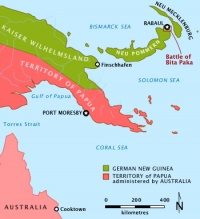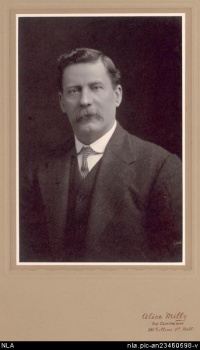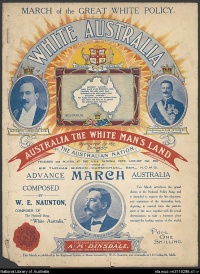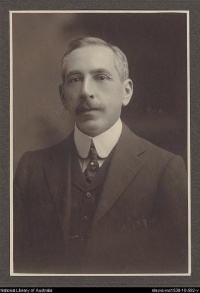Introduction↑
Even though Australia did not decide independently to declare war on any of the Central Powers, it did have its own war aims during the First World War. Under the constitutional arrangements then prevailing within the British Empire, the British government declared war on behalf of the empire including the Dominions (Australia, Canada, Newfoundland, New Zealand, and South Africa). Although the Australian Constitution of 1901 stated that the new national government would have power over "external affairs," this was not interpreted in Melbourne or London to include the conduct of diplomacy with other foreign governments. Indeed, Australia lacked any independent diplomatic service in the years before 1914.
Still, the Australian federal government - led by William Morris "Billy" Hughes (1862–1952) from October 1915 - had a distinctive sense of its war aims during the First World War. These may not have been systematically formulated, in the manner of British Prime Minister David Lloyd George’s (1863–1945) Caxton Hall speech of January 1918 or United States President Woodrow Wilson’s (1856–1924) Fourteen Points. However, the pugnacious Hughes dominated foreign relations to such an extent that he spoke for Australia. He vociferously articulated a distinctive set of Australian war aims in London in 1916, during the Imperial War Conference of 1918, and at the Paris Peace conference of 1919.
British Imperial Power and the Defeat of Germany↑
Australia's primary goal during the war was to preserve the British Empire's global dominance by defeating Germany. This support for the empire was rooted partly in strategic pragmatism. Australians, who numbered fewer than 5 million in 1914, believed that only the Royal Navy could protect the vast continent they had occupied in 1788. Even though Australia had created its own navy in 1911, this could not fully protect the mainland's 36,000-kilometer coastline from external threats; nor could Australia's navy defend the global sea lanes of communication essential to its international trade, which accounted for 42 percent of the Australian national product in 1911–1913.[1] Imperial defense, therefore, provided the framework for Australian defense planning in the pre-war years, even when the German naval race, the establishment of a German East Asia Cruiser Squadron at Tsingdao (Qingdao), China, and the rise of Japan made it clear that there serious challenges to the Royal Navy’s global dominance. The personnel of the Royal Australian Navy (RAN) were wholly interchangeable with those of the Royal Navy; even the RAN’s commander was British, and it was assumed that when war broke out the RAN would be placed under Admiralty control (as, in fact, it was in August 1914).
Loyalty to the British Empire, however, was much more than a strategic calculation - it was a value in its own right. Over 500,000 Australians were born in England, Ireland, Scotland, or Wales.[2] Many more were of Anglo-Celtic descent. They continued to have a profound cultural and emotional identification with the "mother country," which was revered as the source of all that was best in culture, education, political processes, and legal institutions. Britain’s civilizing influence all over the world map was taken as self-evident. Australians, then, willingly embraced a dual identity, finding no contradiction between being Australian nationalists and British subjects simultaneously. Rather, as imperial citizens, they gloried in the race patriotism - described by a founding father of federation, Henry Parkes (1815–1896) as "the crimson thread of kinship" - which defined Australia as a bastion of "whiteness" in the Asian region.
Britain's victory in the First World War, therefore, was a core interest for Australia. Even though the battlefields were thousands of kilometers away, the Minister for Defence, Senator Edward Millen (1860-1923), said in October 1914: "We are fighting to-day for our national existence. ...If it should happen - which God forbid - that the German Emperor should be the victor in this struggle...Australia, or a portion of it, will be the prize claimed for victory."[3]
The lurid possibility of becoming a German colony, controlled by "20th-century Vandals filled with an unholy lust for world dominion,"[4] meant that the majority of Australians also embraced the Allied war aim of liberating Belgium. The occupation and suffering of this small country demonstrated the vulnerability of small powers in an international system in which the rule of international law no longer prevailed. "Poor Little Belgium" became in Australia, as in Britain, the indisputably just cause for which the Allies were fighting and dying.
It was, in fact, a contradiction that Belgian sovereignty was a cause celèbre while the Irish were being denied home rule. For the 22 percent of the Australian population that was Catholic, it seemed patently hypocritical to deny Ireland autonomy while claiming to be fighting for the rights of small nations. Anger on this score, and particularly the brutal suppression of the Easter Uprising in 1916, contributed to the defeat of the two Australian referenda on conscription for overseas military service in late 1916 and 1917. Recognizing this, Hughes pleaded with the British government for the Irish situation to be settled in order to alleviate his domestic political problems, but the contradiction remained unresolved.
German New Guinea↑
Given the Australian fear of German imperialism, it is not surprising that Australia's first involvement in the war was aimed at eliminating the German presence in the Pacific. In August 1914, the British government requested that Australia and New Zealand occupy the German colonies in Samoa, New Guinea, Nauru, and Yap, in the Pelew Islands, thereby neutralizing the wireless communications on which German naval vessels in the Asian region depended. Australia rapidly cobbled together a mixed infantry and naval force and in late September 1914 captured German New Guinea and the surrounding islands. Australia was planning to occupy the Caroline and Marshall Islands north of the equator as well, but the Japanese, who entered the war on the Allied Powers’ side on 23 August 1914, pre-empted them.
This was an unwelcome development for Australia and the British Foreign Office, both of whom feared (with good reason) that Japan would exploit the chaos in Europe to extend its influence in the Pacific. But the Admiralty recognized that they needed the Japanese Navy to police the North Pacific and assist in controlling the German cruisers Scharnhorst and Gneisenau, which were then roaming these seas. The British government therefore acquiesced to the Japanese action; Australia had no choice but to do the same.
Retaining control of German New Guinea became a war aim that Hughes pursued passionately, and relatively successfully, at the Paris Peace Conference in 1919. (At this conference, the Dominions had independent representation for the first time.) Woodrow Wilson opposed the British Empire annexing the former German colonies, particularly as it contravened the fifth of his Fourteen Points: the adjustment of all colonial claims should give equal weight to the interests of the populations concerned. Ultimately, confrontations between the president and Hughes led to a compromise solution. Australia and the other Dominions (who were equally reluctant to relinquish control of the German colonies they had occupied in 1914) became administering authorities under a League of Nations Class C mandate. This meant that Australia, which had administered Papua as a British colony since 1905, had de facto control of much of the strategic islands to its north - islands which, in Hughes’ imagination, encompassed Australia like a fortress. Japan meanwhile was appointed as the mandated authority for the Caroline and Marshall Islands.
Japan↑
This was, in some senses, a pyrrhic victory for Hughes, given that containing Japan was another aim of his wartime governments. In the years before the First World War, Japan’s rising power had inflamed long-standing Australian anxieties about being an isolated European outpost in an Asian region. After the spectacular Japanese victory over the Russian Navy in the Battle of Tsushima in May 1905, it was taken as axiomatic that Japan was intent on threatening Australia: if not physically, as some hysterical invasion-scare literature suggested, then through challenging Australia’s racially restrictive immigration policy. "White Australia" was perhaps the core Australian value: one of the first pieces of legislation passed by the Australian federal parliament in 1901 had been the Immigration Restriction Act.
Australian suspicions of Japan were far from assuaged when Britain signed the Anglo-Japanese alliance of 1902 in an attempt to address its growing problems of imperial overstretch. On the contrary, the alliance seemed to many Australians a cause for lament; as a populist newspaper, Truth, put it on 8 August 1914, "Alas, for dear Australia White! The Japs are pals of Mother!" Even though the Japanese battlecruiser Ibuki formed part of the convoy escorting the first contingent of the Australian Imperial Force to the Middle East in late 1914, fears of Japan persisted throughout the war. Japan seized German ports in Shandong Province and in January 1915 tried to extract more concessions from the weak Chinese government through its Twenty-One Demands. In 1916 Australian Naval Intelligence advised the Hughes government that Japan was not a satiated power and "at some future (and not very distantly future) time" it might put direct hostile pressure on Australia. Australia speculated that Japan might seek to relieve its population pressures by forcing Australia to modify the White Australia Policy, or more seriously, Japan might seek to acquire the wealth of the Dutch East Indies. In the worst case scenario, it might even establish bases on the northwest coast of Australia.[5] Much to Hughes’ alarm, the Japanese also pressured the Australian government in 1915–1916 to agree to an Australian–Japanese commercial treaty, which carried the risk of Japan’s gaining "most favored nation" status in trade, and possibly insisting on changes in Australia’s immigration policy.
The problem for Australia was that on these issues (as, indeed, on many others) it was an illusion to speak of an integrated imperial foreign policy. The British government, though also concerned at the bullying and overbearing Twenty-One Demands, feared that Japan might be enticed by the promise of post-war gains to join the Central Powers. It therefore pressured Hughes, who was in London for consultations in the first half of 1916, to make some concessions. For example, the British wanted Australia to place Japan on a "most favored nation" status in any tariff regime Australia might make and allow visas for Japanese students and tourists and temporary residence for selected groups. While conceding these points, Hughes would not agree to Australia’s joining the Anglo-Japanese Treaty on the same terms as Canada and remained implacable on the question of imperilling White Australia. As he told the British Foreign Secretary Sir Edward Grey (1862-1933), "Australia would fight to the last ditch rather than allow Japanese to enter Australia."[6]
Hughes was no less adamant on this point at the Paris Peace Conference in 1919, where Japan’s growing status was recognized by its inclusion in the Council of Ten. When the Japanese delegation proposed that a racial equality clause be included in the League of Nations Charter, Hughes became the public face of opposition. With minimally disguised racism, he succeeded in having the clause blocked - probably because Woodrow Wilson himself was concerned about opposition within the United States to the possibility of Asian immigration implicit in the racial equality clause.
Hughes’ success on the racial equality clause, of course, had no impact on the wider war aim of constraining Japanese expansionism. At home, some of his political colleagues actually thought it could be counterproductive, in that the egregious offense which Hughes had caused the Japanese in Paris might fuel ultra-nationalism in Japan. Though no less committed to White Australia, his critics argued that concessions on the racial equality clause might have been possible, and the integrity of Australia’s immigration policy might have been preserved by negotiating a "gentleman’s agreement" with Japan, such as existed with Canada. This could have limited the intake of immigrants from Japan while removing the gratuitously offensive aspects of the White Australia policy.
Typically, Hughes did not heed his colleagues’ advice. Arguing, with not a shred of evidence, that the Japanese preferred a "straight-out opponent" to those who made promises that they did not fulfill, he discounted the Japanese press reports, which were not only critical of his behavior but even suggested that Japan should turn its back on the League and "create her own Monroe doctrine in the Orient."[7]
In his passionate defense of White Australia, Hughes almost certainly read the mood of his own electorate accurately. One Melbourne newspaper, the Argus, wrote on 19 April 1919, that Australians’ fear of non-white immigration was "deeper and more instinctive" than simple fear of economic competition and the erosion of living standards. “The intimacy and the meeting, the mixing and the mingling of two differing civilisations means demoralisation; means social, ethical and religious decadence”.[8] White Australia, therefore, not only survived the First World War, but continued until it was progressively dismantled in the 1950s and 1960s.
Reparations↑
Hughes’ very public antics in London and Paris gained him something of a reputation - still perpetuated in Australian historiography - as a Dominion David tackling the Goliaths of Lloyd George and Wilson. Whenever thwarted, Hughes would resort to airing his disputes in the British and American press. In reality, however, there were severe constraints on the capacity of a small power such as Australia to shape the post-war agenda. Though Hughes may have had some success in relation to German New Guinea and the racial equality clause, he failed at the Paris Peace Conference to achieve two of his most cherished war aims: namely, the exclusion of Germany from post-war global trade, and the extraction of reparations that would cover the full cost of the war to Australia.
The destruction of Germany’s economic power and international trade had been an objective of Hughes since the start of the war. As attorney-general in the Labor government of Andrew Fisher (1862–1928) in 1914–1915, Hughes had transferred control of German industries in Australia to Anglo-Australian interests. Then, at the 1916 Paris Economic Conference (which Hughes attended as part of the British delegation) he argued passionately for draconian restrictions on direct and indirect trade with Germany during the war and for an undefined period thereafter.
By the time the war ended, Hughes was determined that Germany should also be made to pay for all the costs that Australia had incurred during the conflict. Reparations that simply restored the physical damage Germany had inflicted on occupied territories were not enough. Indemnities must be paid so that Australia could discharge the accumulated war debt of 300 million pounds, which might otherwise impose a crushing burden of taxation on future generations. So public were Hughes’ views on this subject that Lloyd George appointed him to chair an Imperial War Cabinet Committee responsible for formulating the British position on reparations prior to the Paris Peace Conference. Thanks to Hughes, and the fact that the British election of late 1918 was dominated by the demand to get as much money as possible out of Germany, the British went to Paris committed to getting Germany to pay the greatest possible indemnity consistent with the wellbeing of the British Empire, the peace of the world, and without involving an army of occupation.
However, at Paris it rapidly emerged that there were profound differences among the Allies on the issue of reparations. At first the Americans argued that Germany’s liabilities should be limited to damages arising from its violations of international law, but then they conceded that reparations should cover post-war pensions. This increased the British Empire’s proportion of the payout, but Hughes lost his battle for the recovery of the full cost of the war to Australia. By 1931 when reparations payments finally ended, Australia had received only 5,571 million pounds against a total claim of 464 million pounds (364 million for actual war expenditure and 100 million for capitalized value of pensions, repatriation, and loss to civilian property). Moreover, what it had received was not additional post-war revenue but was largely made up of ships already seized in Australian ports and the value of expropriated property in New Guinea.[9]
The Post-war Order↑
Hughes viewed the final settlement on reparations as a betrayal. Still, he and his cabinet at home accepted it because they refused to take any public position that would damage the unity of the empire. It was, after all, the survival of the British Empire that had been the reason Australia supported the British war effort so wholeheartedly in August 1914. No matter how bitter his disputes were with Lloyd George - and they were particularly so when the British leader failed to consult Australia on the terms of the armistice in October 1918 - Hughes never doubted that it was in Australia’s interests to remain part of the British imperial order. A realist in today’s terms, he viewed the world through Manichaean eyes: a stage on which good and evil forces struggled, in which raw power was the ultimate determinant, and in which the liberal internationalism of Woodrow Wilson was a dangerous illusion. A small power such as Australia had no option but to remain part of the global British imperial system. If anything, when Hughes insisted at the Imperial War Conference of 1918 on improved imperial communications (i.e. giving Dominion prime ministers direct access to the British prime minister), he wanted to strengthen the Empire, including by creating an autarkic post-war economic imperial order from which Germany would be excluded.
Even though Australia seemed to achieve its primary war aim of strengthening the empire through an Allied victory, the irony for Australia was that the First World War left British power eroded. As the interwar years would prove, British hegemony in Europe, like that of France, was false and unsustainable. More fundamentally, the balance of global power had shifted irrevocably towards the United States and Japan. Hughes struggled to understand this in 1919. Deeply distrustful of the United States for having entered the war so late, he described the Treaty of Versailles as "not a good peace" for Australia but a good peace for the United States. The peace settlement was an injustice, inflicted by the insufferable Wilson, whom he described as officiating "as the High Priest in the Temple [League of Nations] in which the Sarcophagus or Ark containing the body or ashes of this amazing gift to Mankind is to rest in majestic seclusion for all time."[10] In retrospect, however, it is clear that the power politics and unpalatable compromises at the Paris Peace Conference were the first of many indications that the international order Australia had gone to war in 1914 to defend was over.
Joan Beaumont, The Australian National University
Section Editor: Peter Stanley
Notes
- ↑ Haig-Muir, Marnie: The Economy at War, in Beaumont, Joan (ed.): Australia’s War 1914–18, Sydney 1995, p. 97.
- ↑ Knibbs, G.H.: Census of the Commonwealth of Australia 1911. Birthplaces, volume II, part II,.issued by Australian Bureau of Statistics, online: http://www.abs.gov.au/AUSSTATS/abs@.nsf/DetailsPage/2112.01911?OpenDocument (retrieved: 8 February 2014).
- ↑ Australia, Parliament, Senate, 14 October 1914, http://parlinfo.aph.gov.au/parlInfo/search/display/display.w3p;adv=yes;orderBy=customrank;page=0;query=Content%3A%22our%20national%20existence%22%20Date%3A14%2F10%2F1914%20%3E%3E%2014%2F12%2F1914%20Dataset%3Ajournals,orderofbusiness,hansards,hansards80,notices,websds,senators,practces,orderss,websenguide,procbull,broadcastSen;rec=0;resCount=Default (retrieved 15 September 2014).
- ↑ Argus, 11 September 1914.
- ↑ Meaney, Neville: Australia and World Crisis. 1914–1923, Sydney 2009, pp. 126-30.
- ↑ Ibid., p. 146.
- ↑ Ibid., p. 374.
- ↑ Ibid., p. 379.
- ↑ Scott, Ernest: Australia During the War. The Official History of Australia in the War of 1914–1918, volume IX, Brisbane 1989 (1936), p. 808; Fitzhardinge, L.F.: The Little Digger 1914–1953. William Morris Hughes: A Political Biography, volume II, London 1979, p. 387.
- ↑ Fitzhardinge, Little Digger 1979, p. 373.
Selected Bibliography
- Beaumont, Joan: Broken nation. Australians in the Great War, Crow's Nest 2013: Allen & Unwin.
- Fitzhardinge, L. F.: The little digger 1914-1953. William Morris Hughes. A political biography, volume 2, London 1979: Angus & Robertson.
- Hudson, W. J.: Billy Hughes in Paris. The birth of Australian diplomacy, Melbourne 1978: Thomas Nelson Publishers.
- Mackenzie, S. S.: The Australians at Rabaul. The capture and administration of the German possessions in the southern Pacific, volume 10, Sydney; St. Lucia 1927: Angus & Robertson; University of Queensland Press.
- Meaney, Neville: A history of Australian defence and foreign policy 1901-23. Australia and world crisis, 1914-1923, volume 2, Sydney 2009: Sydney University Press.
- Scott, Ernest: Official history of Australia in the war of 1914–1918. Australia during the war, volume 11, St. Lucia 1936: University of Queensland Press.












